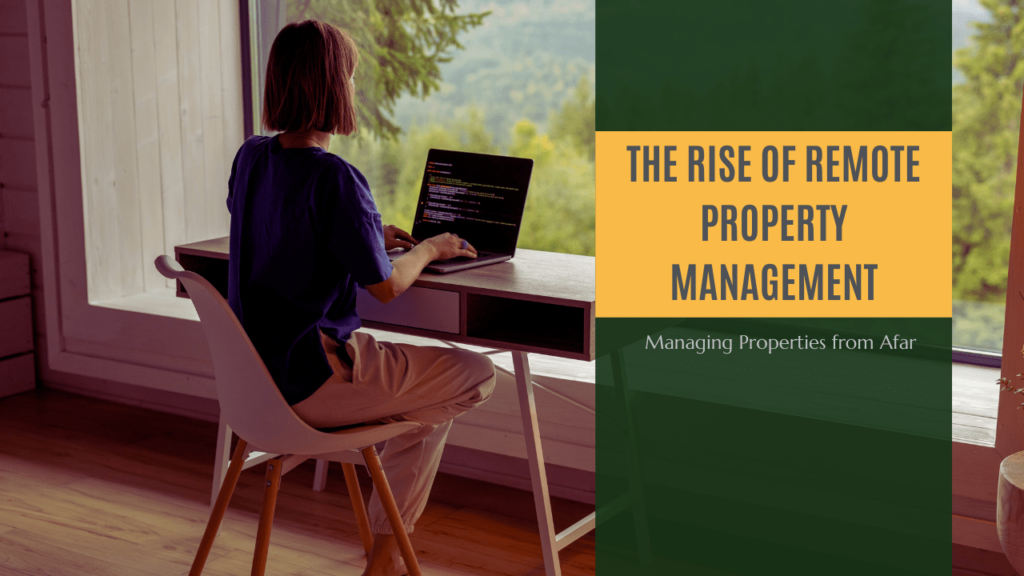
We’ve learned a lot over the last few years, and one of the things that’s hard to ignore is the fact that we can do so much remotely. People are working remotely. They’re going to school remotely. They’re joining meetings from all over the world, attending parties and gatherings virtually when they cannot be there in person, and even finding community in remote locations that are not local to where they are at any given moment.
People are also buying investment properties remotely. This is easy enough, especially if you have great technology and a lot of local knowledge in the market where the investment is being made.
We know that you can invest remotely, but can you manage your Colorado Springs rental property from afar?
The question is not necessarily can you, but should you.
Let’s take a look at the rise of remote property management and talk about what’s best for your investments.
How to Manage Remotely if You Must
Managing remotely isn’t easy, but it is possible. If you want to do it well, we recommend good technology, an outstanding Colorado Springs property management partner, and an appreciation for the local rental market and its demands.
What you’ll need more than anything is good technology.
This is the main reason that remote management has risen in popularity: technology makes it easier.
When you’re going to manage your Colorado Springs property remotely, you need access to good technology. Otherwise, it will be difficult to keep up with rental payments from your tenants, maintenance requests that need to be handled, inspections that must be scheduled and completed, and accounting that has to remain detailed and transparent. As a remote owner, you can use technology to:
- Market and advertise from afar. When you’re looking for a tenant, you’ll need a great listing that includes high-quality photos, detailed descriptions, and all the information a tenant wants when choosing a place to live, such as the rental amount and whether pets are allowed. Then, you’ll want to get that listing onto all the best and most popular rental websites so it gets a lot of exposure. A good technology platform will allow you to syndicate a single listing across multiple rental sites.
- Conduct showings. Again, showing a property remotely is easier because of the tech that’s available. With self-showing technology, you don’t even have to be anywhere near your property to show it. You can have a lockbox or a digital keypad installed, giving approved people access to your home. Prospective tenants can look around on their own and message you with questions.
- Collect and screen applications. Tenants expect online applications, and you’ll use those online applications to check for criminal and credit histories, evictions in the past, and rental history. You can verify income and identification and even use a third-party screening service to ensure you’re compliant with all fair housing laws while you screen tenants. Since this can all be done online, you can manage it from afar.
- Sign the lease agreement. Thanks to DocuSign and similar networks, you can share the lease agreement with your approved tenant, sign it, and keep it filed online.
Good technology will also help you collect and track maintenance requests, collect on-time rental payments, and document all of your income and expenses. Investigate the best technology for remote property owners, and be willing to invest in the right solutions.
Understanding the Value of Local Colorado Springs Property Managers
If you plan to rent out your Colorado Springs home from somewhere else, your best opportunity for consistent rents and a well-maintained property is through a local property management company.
There is a lot you can do remotely; we’ve already talked about many of them. Thanks to technology and virtual platforms and the expectations of tenants that they’ll spend very little time with you in person, you can manage many aspects of your property remotely. That doesn’t mean that you’ll have the best experience. That’s because an expert, in-person presence is often required. Even if it’s not required, it can make a difference in tenant experience, which will impact rental payments, property maintenance, and retention.
How will you handle emergency maintenance needs? It’s not like you can run over to the property when a tenant calls in the middle of the night to report a flood or a fire.
Will you be able to schedule and follow up on preventative maintenance services, and the inspections that are necessary before, during, and after a tenancy? This is where a local management company can be invaluable. You’ll have professional eyes on your investment.
If a tenant stops paying rent, you may need to pursue eviction through the courts, and a property manager with experience in these situations will be invaluable. It’s also important to have someone who is available to go to the courthouse and file and serve the necessary paperwork. Some legal matters can be handled online, but others will require an in-person presence. If an eviction gets to the point that a sheriff needs to physically remove a tenant and their property, someone will need to be there to change the locks. That can’t be you if you’re living elsewhere.
When it comes to the move-out inspection and decisions about the security deposit, remote management will not work. You need to have someone there taking pictures, making notes, and scheduling turnover work.
Property managers will have access to licensed, insured, and cost-effective vendors and contractors when your property has maintenance needs. You can receive and evaluate maintenance requests remotely, but having your property managers present to coordinate the necessary work with your tenants and their vendors is important. You need to be sure the right vendor is responding. You need to know that further damage is being prevented, and you want to make sure your tenants are satisfied with the work that was done.
Relationships are important when we’re talking about Colorado Springs property management, and those relationships are usually very local.
Your property manager will:
- Collect rent from your tenants on time every month. Online portals make this easy to do from afar, but if there’s a tenant who likes to drop off a check in person, your property manager is there.
- Enforce the lease agreement. You cannot drive by your property once in a while to make sure everything looks to be on point. Your property manager can, and may detect a reason to conduct an inspection or make sure that the lease is being followed and the property is being cared for.
- Act as the first point of contact for your tenants, vendors, HOA, and any other interested parties. We handle everything that simply cannot be done remotely.
There’s more to this relationship than management services. It’s also expertise. Property managers have put together a number of processes and systems that work. We have relationships and resources that will benefit you and your property.
Remote Management and Market Knowledge
If you’re going to manage a Colorado Springs property remotely, you have to be very aware of what’s going on in the local rental market. You might be able to follow it from wherever you are, but it helps to have some experts in the area who can share the insights and analytics that they have gathered about how the market and your potential competition are performing.
Whether you’re managing remotely on your own or with the help of a management partner, make sure you know:
- What prices look like. To accurately set a rental value, you need to understand what homes similar to yours are renting for, and how long they’re taking to rent. You might have an idea of what your home is worth, but if you’re not involved in the local market every day, you might be surprised to learn that your property is actually worth more or less on the current rental market. Rents have risen dramatically over the last year or two. But, you need up-to-date information. You cannot price your property at what the market demanded four months ago.
- The latest trends and shifts when it comes to residents. You need to know what tenants are looking for, and how to attract them. This will impact how you market your home, what kind of amenities you offer, and whether you make any improvements, upgrades, or renovations during turnover periods.
- Rental regulations. Pay attention to state, local, and federal laws. Renting out a home in Colorado Springs is risky, no matter how prepared and experienced you are. Without being here, you could find yourself to be at a disadvantage when it comes to potential legal mistakes. You need to understand fair housing laws, security deposit requirements, habitability issues, and eviction protocols. Service animals are different from support animals. Pay attention to the latest laws and the upcoming legal changes, otherwise, you are at risk.
 Stay in touch with the people who are working in the Colorado Springs rental market every day. Your property manager will be a great resource.
Stay in touch with the people who are working in the Colorado Springs rental market every day. Your property manager will be a great resource.
If you need support while managing a home remotely or you have any questions about Colorado Springs or Pueblo property management, please contact us at Muldoon Associates.
